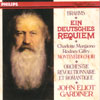Brahms German Requiem
View record and artist detailsRecord and Artist Details
Composer or Director: Johannes Brahms
Genre:
Vocal
Label: Classics
Magazine Review Date: 4/1991
Media Format: CD or Download
Media Runtime: 66
Mastering:
Stereo
DDD
Catalogue Number: 432 140-2PH

Tracks:
| Composition | Artist Credit |
|---|---|
| (Ein) Deutsches Requiem, 'German Requiem' |
Johannes Brahms, Composer
Charlotte Margiono, Soprano Johannes Brahms, Composer John Eliot Gardiner, Conductor Monteverdi Choir Orchestre Révolutionnaire et Romantique Rodney Gilfry, Baritone |
Composer or Director: Johannes Brahms
Label: Classics
Magazine Review Date: 4/1991
Media Format: Cassette
Media Runtime: 0
Mastering:
Stereo
DDD
Catalogue Number: 432 140-4PH

Tracks:
| Composition | Artist Credit |
|---|---|
| (Ein) Deutsches Requiem, 'German Requiem' |
Johannes Brahms, Composer
Charlotte Margiono, Soprano Johannes Brahms, Composer John Eliot Gardiner, Conductor Monteverdi Choir Orchestre Révolutionnaire et Romantique Rodney Gilfry, Baritone |
Author: Lionel Salter
The other thing which strikes one is the huge dynamic range of this recording: the forte (here fortissimo) entries of the march-like ''Denn alles Fleisch'' are overwhelming—a forte first choral entry in this second movement is probably explicable by the use of a new performing edition; and the climactic build-up from (to adopt the English translation) ''At the sound of the trumpet'' to the cries of ''Death, where is thy sting?'' (in which Gardiner artfully, and with great effect, lengthens the pauses between the cries of ''Where?'') is enormously thrilling. This sixth movement, by the way, is started unusually fast, the only unorthodox tempo (despite his iconoclastic claims) Gardiner adopts in the work.
The solo baritone is a real find: an admirably focused voice with cleanly projected words and sensitive tonal gradations: if the soprano, pure-voiced and consoling, seems slightly less distinguished, it may be that she is set a trifle too far from the microphone. Pains have been taken throughout to bring out contrapuntal strands with clarity, both in the chorus and in the orchestra; and here the employment of period instruments (particularly noticeable in the case of the oboes and horns, and with the hard sticks adding extra menace to the timpani's triplets in the second movement) and of selective string vibrato proves to make a significant contribution. In the past Gardiner has sometimes been accused of minimizing the spiritual quality of religious works: that can certainly not be said of this outstanding performance.'
Explore the world’s largest classical music catalogue on Apple Music Classical.
Included with an Apple Music subscription. Download now.

Gramophone Digital Club
- Digital Edition
- Digital Archive
- Reviews Database
- Events & Offers
From £9.20 / month
Subscribe
Gramophone Club
- Print Edition
- Digital Edition
- Digital Archive
- Reviews Database
- Events & Offers
From £11.45 / month
Subscribe
If you are a library, university or other organisation that would be interested in an institutional subscription to Gramophone please click here for further information.






